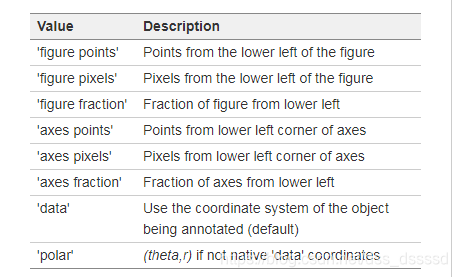matplotlib7 --文字註釋 annotate() and text()
阿新 • • 發佈:2018-12-03
圖的文字註釋:
- annotate()
- text()
1. Axes.annotate(s, xy, *args, **kwargs)
用text s註釋point xy
引數:
- s : str 註釋文字
- xy: (float, float) 要註釋的點(x, y)
- xytext: (float, float) optional s顯示的位置。 預設xy
- xycoords: xy所採用的座標系, 預設是’data’

- textcoords: xytext所採用的位置確定方法

預設是xycoords,既採用和xycoords一樣的座標系統。
-
arrowprops: 在xy和xytext之間指向箭頭的屬性 引數型別為dict
-
如果 字典中沒有’arrowstyle’ 鍵,則使用一下鍵值

-
如果包含’arrowstyle’, 則使用一下鍵值
允許的arrowstyle包括:

有效的鍵包括:

-
-
annotation_clip
當xy在Axes區域外時,是否還要註釋- True: 只有當xy在Axes內是才註釋
- False: 註釋總是會被新增
- None:只有xy在Axes內並且xycoords是’data’才註釋
**kwargs
其餘的引數都傳給Text
在之後的文章中會進一步介紹箭頭的屬性設定等更深入的話題
- 先看一個簡單的例子:
fig = plt.figure()
ax = fig.add_subplot(111)
t = np.arange(0.0, 5.0, 0.01)
s = np.cos(2*np.pi*t)
line, = ax.plot(t, s, lw=2)
ann = ax.annotate("local max",
xy= 
- 一個相對完整的作圖例子
import matplotlib.pyplot as plt
import numpy as np
x = np.linspace(-np.pi, np.pi, 128,endpoint=True)
cosx,sinx,x_3 = np.cos(x), np.sin(x), x / 3
#%%
fig = plt.figure(1)
axes0 = plt.subplot(111)
line1, line2 = axes0.plot(x, cosx, 'r',x, sinx, 'c')
line1.set_linewidth(2.5)
line2.set_linewidth(1)
# plt.xlim(x.min() *2, x.max()*2)
axes0.set_xlim(x.min() *1.2, x.max()*1.2)
axes0.set_ylim(cosx.min() * 1.2, cosx.max() * 1.2)
axes0.set_xticks([-np.pi, -np.pi/2, 0, np.pi/2, np.pi])
axes0.set_xticklabels([r'$-\pi$', r'$-\frac{\pi}{2}$', 0, r'$+\frac{\pi}{2}$', r'$+\pi$'])
axes0.set_yticks([-1, 0, 1])
axes0.set_yticklabels([r'-1', r'0', r'+1'])
# add legend
axes0.legend([line1, line2], ['y=cos(x)', 'y=sin(x)'])
# 軸居中
axes0.spines['right'].set_color('none')
axes0.spines['top'].set_color('none')
axes0.xaxis.set_ticks_position('bottom')
axes0.spines['bottom'].set_position(('data',0))
axes0.yaxis.set_ticks_position('left')
axes0.spines['left'].set_position(('data',0))
# 添加註釋
t = 2 * np.pi / 3
# 通過將[t, 0], [t, np.sin(t)]連線起來使得圖更好看一些。
axes0.plot([t, t], [0, np.sin(t)], color='c', linewidth=1.5, linestyle="--")
axes0.scatter([t],[np.sin(t)] ,s=50, c='c')
axes0.annotate(r'$\sin(\frac{2\pi}{3})=\frac{\sqrt{3}}{2}$',
xy=(t, np.sin(t)), xycoords='data',
xytext=(+10, +30), textcoords='offset points',
fontsize=16, color= 'c',
arrowprops=dict(arrowstyle="->", connectionstyle="arc3,rad=.2"))
# 同樣對cosx做處理
axes0.plot([t, t], [0, np.cos(t)], color='r', linewidth=1.5, linestyle="--")
axes0.scatter([t],[np.cos(t)] ,s=50, c='r')
axes0.annotate(r'$\cos(\frac{2\pi}{3})=-\frac{1}{2}$',
xy=(t, np.cos(t)), xycoords='data',
xytext=(-90, -50), textcoords='offset points',
fontsize=16, color= 'r',
arrowprops=dict(arrowstyle="->", connectionstyle="arc3,rad=.2"))
plt.show()

- 看一個極座標系的作圖
fig = plt.figure()
ax = fig.add_subplot(111, polar=True)
r = np.arange(0, 1, 0.001)
theta = 2 *2 * np.pi * r
# 前兩個是特例
# line, = ax.plot([4*np.pi]*1000, r, color='#ee8d18', lw=3)
# line, = ax.plot(theta, [1]*1000, color='#ee8d18', lw=3)
line, = ax.plot(theta, r, color='#ee8d18', lw=3)
# 在第800個點出註釋
ind = 800
thisr, thistheta = r[ind], theta[ind]
ax.plot([thistheta], [thisr], 'o')
ax.annotate('a polar annotation',
xy=(thistheta, thisr), # theta, radius
xytext=(0.1, 0.1), # fraction, fraction
textcoords='figure fraction', # 從左下角開始,註釋文字起始位置所佔Figure總長度的比例(0~1)
horizontalalignment='left',
verticalalignment='bottom',
arrowprops=dict(arrowstyle="->", connectionstyle="arc3,rad=.2")
)
plt.show()

